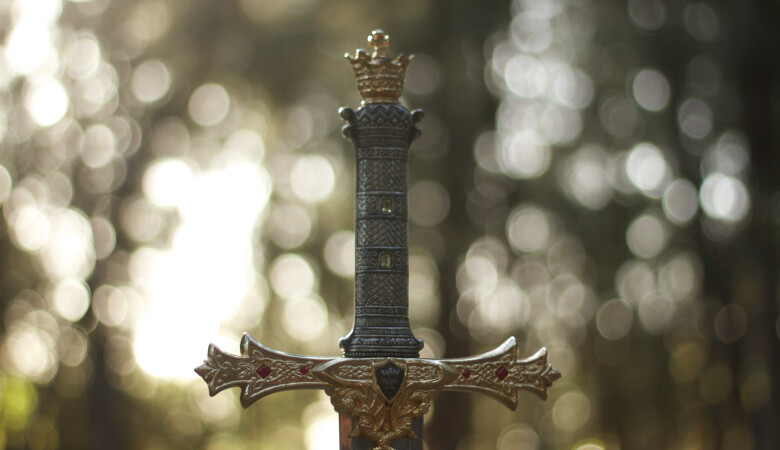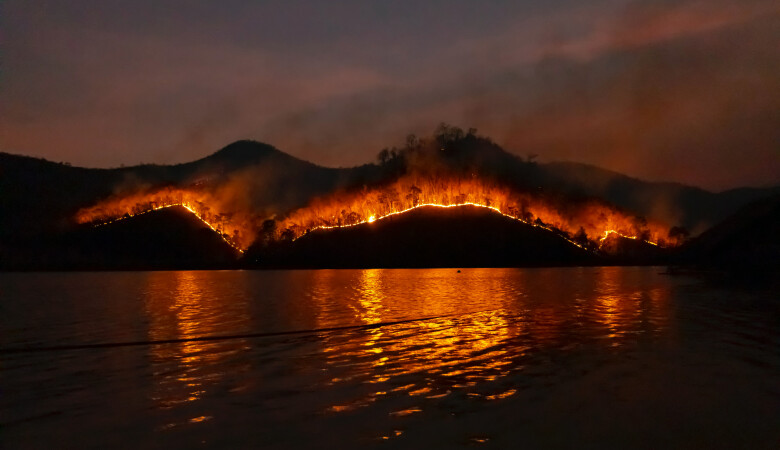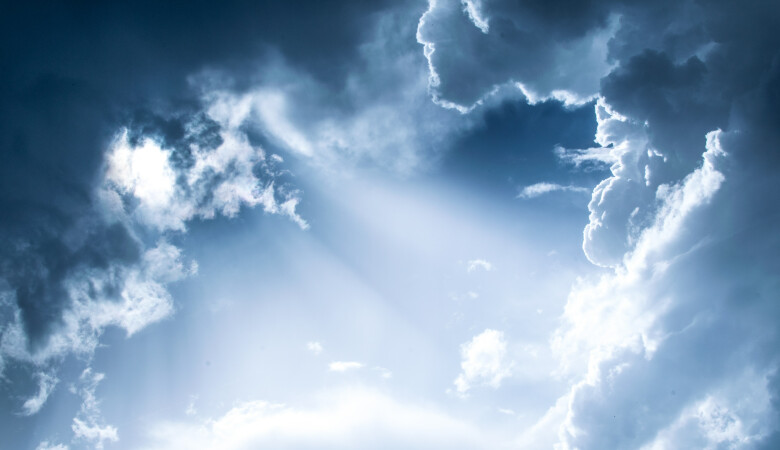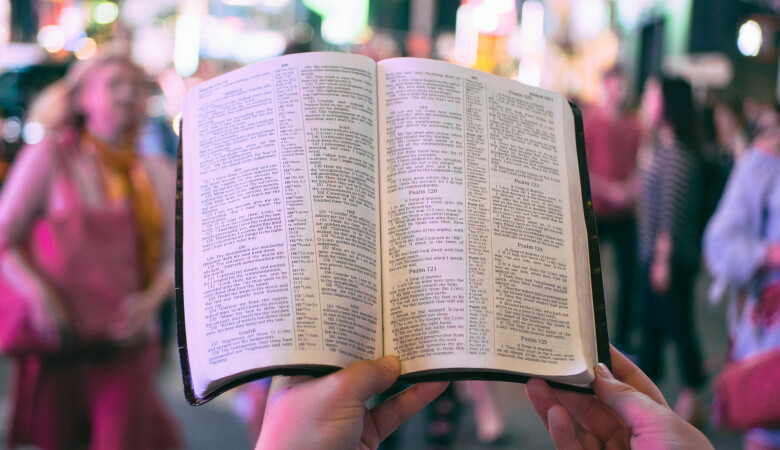The Life of Elijah - Week 9
July 28, 2002 | Andy Davis
1 Kings 19:9-21
Glory of God, Humility
Pastor Andy Davis preaches a verse-by-verse expository sermon on 1 Kings 19:9-21. The main subject of the sermon is Elijah's meeting with God and the call of Elisha.
- SERMON TRANSCRIPT -
We are looking tonight at 1 Kings 19. And as we saw in the first part of 1 Kings 19, Elijah, suddenly overcome by terror and fear of man, fear specifically of a woman in this case, he's afraid of Jezebel, runs for his life, wants to die. He's lost all perspective. He gets out into the desert and he lays down. He wants to die. He says, "Take my life, I'm no better than my forefathers." He's ready to die and God is not ready for him to die. Instead, he wants to replenish and refresh him. And so he sends him some food and a little jar of water by the angel's hand. And so he eats and then he falls back asleep. And then God calls on him to wake up again and he does it again. And he says, "Get up and eat" in verse 7, "for the journey is too much for you." And so he got up and eaten and drank. And then in verse 8 it says, "Strengthened by that food, he traveled 40 days and 40 nights until he reached Horeb, the mountain of God. And there he went into a cave and spent the night." And that's about where we left it last time.
Now, he traveled about 200 miles in 40 days. Now, you work that out, you realize he wasn't in any major hurry to get there. That's about five miles a day. He could have probably done it easily in 10 days. But it's also amazing in that God used that last little cake and jar of water to sustain him for 40 days miraculously. And that he would go to Horeb is very significant as we're going to see. Now, we're going to begin in verse 9, middle of verse 9, and then read to the end of the chapter, “And the word of the Lord came to him, ‘What are you doing here, Elijah?’ He replied, ‘I've been very zealous for the Lord God Almighty. The Israelites have rejected your covenant. They've broken down your altars and put your prophets to death with the sword. I am the only one left and now they are trying to kill me too.’ The Lord said, ‘Go out and stand on the mountain in the presence of the Lord for the Lord is about to pass by.’" Oh, that brings goose bumps, doesn't it? I can't even get past that,
“The Lord is about to pass by.” Then a great and powerful wind tore the mountains apart and shattered the rocks before the Lord, but the Lord was not in the wind. After the wind there was an earthquake, but the Lord was not in the earthquake. And after the earthquake came a fire, but the Lord was not in the fire. And then after the fire came a gentle whisper, still small voice. And when Elijah heard it, he pulled his cloak over his face and went out and stood at the mouth of the cave. Then a voice said to him, “What are you doing here, Elijah?” He replied, “I have been very zealous for the Lord God Almighty. The Israelites have rejected your covenant, broken down your altars, put your prophets to death with the sword. I am the only one left and now they are trying to kill me too." The Lord said to him, “Go back the way you came and go back to the desert of Damascus. And when you get there, anoint Hazael, king over Aram. Also anoint Jehu, son of Nimshi, king over Israel. And anoint Elisha, son of Shaphat from Abel Meholah to succeed you as prophet. Jehu will put to death any who escape the sword of Hazael, and Elisha will put to death any who escaped the sword of Jehu. Yet, I reserve 7,000 in Israel, all whose knees have not bowed down to Baal and all whose mouths have not kissed him.” So Elijah went from there and found Elisha, son of Shaphat. He was plowing with 12 yoke of oxen, and he himself was driving the 12th pair. Elijah went up to him and threw his cloak around him. Elisha then left his oxen and ran after Elijah. “Let me kiss my father and mother goodbye,” he said, “And then I will come with you.” “Go back,” Elijah replied, “What have I done to you?” So Elisha left him and went back. He took his yoke of oxen and slaughtered them, burned the plowing equipment to cook the meat and gave it to the people and they ate. Then he set out to follow Elijah and became his attendant.
So we have in this account a story of how God ministers to his prophet. Now, Elijah has reached the end of his rope. He's fatigued, he's tired. And I think we get two prominent themes, therefore, out of this situation. Number one, we get the bitter fruits, I think, of Elijah's sin. Elijah has turned away from the purposes of God. We know that because the hand of the Lord came on him powerfully and he ran ahead of the chariot and got to Jezreel. Now, we can't imagine that the hand of the Lord would've come on him so powerfully that he would immediately abandoned his post and run to the desert. And so we can only speculate, we can only surmise as to what God intended in Jezreel had he stood at his post. What kind of revival, what kind of changes would've been made? We have no idea.
But yet in the middle of all this, number two, we see God's tender mercies and his gentleness in dealing with us in our sin. And I think all of us can relate to that. There are no perfect servants of God. God takes ordinary sinners, people like you and me, and he uses us in mighty way. We see therefore lived out here before us in all of the ways that God ministers to Elijah. We see the truth of Psalm 23:1-3, "The Lord is my shepherd. I shall not be in want. He makes me lie down in green pastures. He leads me beside quiet waters." And what's the next part? "He restores my soul." Now, how many of us have needed soul restoration at some point in our journey? Sometimes you think, "I need it every day," and to some degree you do. But there are times that you get very low in your service to God and you need him to restore your soul. You know, there is a strain of worship and hymns in which there's a sense in which every day is better than the day before. Every day brighter, every day more powerful. Every day's stronger than the day before. Is that your experience? Do you find that every day is better than the last day? That you're 10 times the Christian now that you were a year ago? Are you finding that to be true? Now, we should be growing in the Lord, but you know, if our experience was going to be an unbroken line right up to perfection and right up to heaven, then why would you need Psalm 23:3? "He restores my soul." You wouldn't need it at all. But your soul does need restoration. I think that's exactly what God is doing for Elijah here.
"There are no perfect servants of God. God takes ordinary sinners, people like you and me, and he uses us in mighty way. "
Now, I think Elijah deserves some correction. I think he deserves a rebuke. And to some degree in the text, there is a gentle rebuke here, isn't there? God asks him, not once but twice. There's the same question. What does he ask him twice? "What are you doing here, Elijah?" I think that's significant. "What are you doing here?" The implication being, "You should be in Jezreel." Okay? But yet at the same time we see the hand of God very, very gently.
Now, he goes into this cave and he spends the night. And the word of the Lord comes to him and says in verse 9, "‘What are you doing here, Elijah?’ And he replied, ‘I have been very zealous for the Lord God Almighty. The Israelites have rejected your covenant, broken down your altars, put your prophets death with the sword. I am the only one left and now they're trying to kill me also.’" Now, we pointed out before just how self-centered Elijah is in all of this. He's focused completely on himself. That is the problem here. Frank and I were talking about this last time. He said, "This is not an issue of depression, it's an issue of focus. He's focusing on himself and not on the power of God." And if that's the case, then what will God do to restore him? He'll get his eyes off of himself back onto what God can do. "I have power, Elijah. Why did you run? I am able to bring fire down from the heavens and protect you," as we will see in 2 Kings chapter 1. God is able to protect his servants. You had nothing to fear from Jezebel, so why did you run? The power of God. And so the cure to self focus, to selfishness, to get your eyes off of yourself onto, number one, the Lord, and secondly onto God's people. And that's in effect what he does. He first gives him a sense of his presence and power and he passes by and we get the still small voice and then we get business. "Now, get up and get busy. Go anoint this man and anoint that man and understand that I've reserved 7,000, who have not bowed the knee to Baal. God's people are out there. Now, get out and get busy.” Where is the so-called depression at that point? There's work to be done. And we have a powerful God, we have an energetic God, and that's efficient for us. So I think that's how he restores his soul. He focuses Elijah off of himself onto God. And then secondly, to look at God's work in God's people. So that's what we're going to do.
Now, he goes to Mount Horeb. And this is a very significant thing that he ends up there. The 200 mile journey after 40 days, he ends up at Mount Horeb. Now, Mount Horeb's called the mountain of God and has a deep and rich history for Israel. God first appeared to Moses in the flames of a burning bush on Mount Horeb. In Exodus 3:1 and following it says this, "Now, Moses was tending the flock of Jethro, his father-in-law, the priest of Midian, and he led the flock to the far side of the desert and came to Horeb, the mountain of God. There the angel of the Lord appeared to him in flames of fire from within a bush. Moses saw that though the bush was on fire, it did not burn up. So Moses thought, 'I will go over and see this strange sight why the bush does not burn up'. When the Lord saw that he had gone over to look, God called to him from within the bush, 'Moses! Moses!' And Moses said, 'Here I am,'” verse 5 of Exodus 3, “'Do not come any closer,' God said, 'Take off your sandals, for the place where you're standing is holy ground'." So that's Mount Horeb. The burning bush happens on Mount Horeb. And that's where Moses gets his call to go back to Egypt and to lead the people out, people of Israel out of Egypt. Now in that same encounter, God also commanded that Moses should bring his people to that very mountain to worship. In Exodus 3:10 and following, it says, "So now go. I am sending you to Pharaoh to bring my people, the Israelites, out of Egypt. But Moses said to God, 'Who am I that I should go to Pharaoh and bring the Israelis out of Egypt?' And God said, 'I will be with you'." Isn’t that wonderful? He says to Moses, "I'm going to give you a big job. I want you to go and do a great work." And Moses answer is so typical, "Who am I that I should do a great work?" And God's answer is perfect, "I will be with you." The point is, “You're nothing! You're a vessel. You're dust. You're a jar of clay. You are not the point.” And that's in effect what he's doing with Elijah. He's getting his eyes off of him saying, "You're not the point. I've got a great work for you to do. So get your eyes off yourself." Can you imagine God saying, "Well, you know something? Actually, Moses, you have some hidden talents. There's more there than meets the eye with you, Moses. You've really been underestimating yourself all this time. Now sit down and listen and I'm going to build up your self esteem. I'm going to tell you just how strong you are and how capable you are and all the mighty things that you'll be able to do." Can you imagine God counseling that way? In effect, he's saying, "Forget about you. In a few years you'll be dead and you'll be with me. All right? But I can do great things through somebody like you." He says, “I will be with you." And that's in effect his same message to Elijah.
So Mount Horeb, the same place, and God says, "I will be with you and this will be the sign to you that it is I who have sent you. When you have brought the people out of Egypt, you will worship God on this mountain." Do you hear that? So Mount Horeb would also be the focal point of the exodus. They were going to come out of Egypt, they're going to cross through the Red Sea. They were going to go through the desert and they were going to worship God at this specific mountain. That was the call of God, Mount Horeb. Now after he has encountered, God, Moses now, he's come down off the mountain and God said that Aaron would be with him and it was at that very same mountain that Aaron came to meet Moses. Exodus 4:27, it says, "The Lord said to Aaron, 'Go into the desert to meet Moses.' So he met Moses at the mountain of God and kissed him. Then Moses told Aaron everything the Lord had sent him to say and also about all the miraculous signs he commanded him to perform." And from that interaction, they went and began to call the people of Israel, reveal themselves to the people of Israel and do those miraculous signs that God had called them to do.
Now, after the Exodus, it was to Mount Horeb that he brought the people. And it was right there that the waters of quarreling at Rephidim occurred. This is in Exodus 17, "The whole Israelite community set out from the Desert of Sin, traveling from place to place as the Lord had commanded. They camped at Rephidim but there was no water for the people to eat or to drink. So they quarreled with Moses and said, 'Give us water to drink.' And Moses replied, 'Why do you quarrel with me? Why do you put the Lord to the test?' But the people were thirsty for water there and they grumbled against Moses. They said, 'Why did you bring us out of Egypt to make us and our children and livestock die of thirst?' Then Moses cried out to the Lord, 'What am I to do with these people? They're almost ready to stone me'." In verse 5 of that chapter, the Lord answered Moses, "Walk on ahead of the people, take with you some of the elders of Israel and take also in your hand the staff with which you struck the Nile, and go. I will stand there before you at the rock at Horeb." So there at the Mount Horeb, he stands before him, “‘Strike the rock and the water will come out of it for the people to drink.’ So Moses did this in the sight of the elders of Israel. And he called the place Massa and Meribah because the people, the Israelites quarreled, and they tested the Lord saying, 'Is the Lord among us or not?'" very, very significant moment that happens right there at the base of Mount Horeb. We learn later from 1 Corinthians 10 that that rock was a symbol of Christ and the water that flowed, the water of life is symbol of life through Christ, but it happens there at the base of that mountain. And then it was at Mount Horeb that God gave Israel the 10 Commandments.
Now, it's actually not easy to put this together because in the Exodus account, it calls it Mount Sinai. It's really in Deuteronomy that we understand that it's at that same mountain, Mount Horeb, that the 10 Commandments were given. Deuteronomy 4, "Remember the day you stood before the Lord your God at Horeb when he said to me, 'Assemble the people before me to hear my words so that they may learn to revere me as long as they live in the land and may teach them to their children.' You came near and stood at the foot of the mountain while it blazed with fire to the very heavens, with black clouds and deep darkness. And then the Lord spoke to you out of the fire. [Listen] You heard the sound of words, but you saw no form. There was only a voice. He declared to you as covenant the 10 Commandments which he commanded you to follow, and then he wrote them for you on two stone tablets. And the Lord directed me at that time to teach you the decrees in the laws you are to follow in the land that you are crossing the Jordan to possess. You saw no form of any kind the day the Lord spoke to you at Horeb out of the fire. Therefore, watch yourselves very carefully so that you do not become corrupt and make for yourselves an idol." incredibly significant what happens. They go to Mount Horeb and God comes down in a cloud and fire and an earthquake. And there he is and he speaks out of that the word of God. And there's no form, there's nothing visible, just a voice. Just the voice of God. And he speaks to them the words of his covenant and he said, "You didn't see any form there, so don't make any physical representation of me because you can't. There's no physical thing you can make that represents me adequately. Make no idol." You remember at that time when God spoke, it was so terrifying to the people. It was so terrifying that they said, "Please tell God to stop because if we keep hearing this voice, we will surely die." And God said, "What the people have said is good. I will speak to them from now on through a prophet.” You know, tone it down a bit; the people couldn't handle it.
And so God spoke to them on that mountain, Mount Horeb, very significant for what's about to happen with Elijah, because God had called his people to covenant faithfulness at that moment. He'd called them to the 10 Commandments. He'd called them to the Mosaic law, and they had broken this law. The very thing that Elijah is saying to God, "They've broken your commandments." God has brought Elijah as his representative back to this mountain, back to this place, back to the starting place for Israel and said, "Remember the covenant and remember also what happened at this mountain. You saw no form. It was just the voice of God, just the voice of God." I'm telling you something, there's a unifying theme between this morning’s sermon and also this, and that is the power of the word of God. Do you see it? It's just the voice of God as he speaks and it is powerful. There's no form, just a voice. And it was also finally at Horeb that God appeared to Moses. Moses went up on the mountain to receive the 10 Commandments. And in Exodus 33, Moses said to the Lord, "You have been telling me lead these people, but you have not let me know whom you'll send with me. You have said I know you by name and you have found favor with me. Well, if you're pleased with me, then teach me your way so that I may know you and continue to find favor with you. Remember that this nation is your people." And this is what Moses says to God. If you can boil all that down, he says, "God, I want to know you. I'm hungry to know you." So also the Apostle Paul, in Philippians 3 he said, "I want to know Christ." After all of the revelations that God had sent to the Apostle Paul, he said, "I want to know Christ and the power of his resurrection, the fellowship of sharing in his sufferings, becoming like him in his death. So somehow to attain to the resurrection from the dead." He said, "I want to know Christ.” Jesus in his prayer, “Now, this is eternal life that they may know you the only true God and Jesus Christ whom you have sent." And so also it is here. Moses up on the mountain says, "I want to know you." “The Lord replied, ‘My presence will go with you and I will give you rest.’ Then Moses said to him, ‘If your presence does not go with us, do not send us up from here. How will anyone know that you are pleased with me and with your people unless you go with us? What else will distinguish me and your people from all the other people on the face of the earth?’ And the Lord said to Moses, ‘I will do the very thing you've asked because I am pleased with you and I know you by name.’" In other words, "I will go with you. I will be with you. That's how the people will know that you are my chosen people because I go with you.” “Then Moses said,” now this is one of the boldest prayers in the entire Bible, "Now show me your glory." That's amazing. "Show me your glory. And not that tone down thing. I want to see the whole thing. Show me your full glory," said Moses. That's what he wants. Is that your heart too? Do you want to see God's glory? I do. He said, "‘Now, show me your glory.’ And the Lord said, ‘I will cause all my goodness to pass in front of you and I will proclaim my name, the Lord, in your presence. I will have mercy on whom I have mercy,’” “You know it's up to me who I show my glory to," that's what he's saying. "I don't owe it to anybody.” “I will have mercy on whom I have mercy, and I will have compassion on whom I will have compassion. But you cannot see my face for no one can see me and live.” “You can't survive.” So he prayed for something that would kill him. He probably would've been happy in the death. But he said, "You can't survive. You can't endure." We get the New Testament version of it in 1 Corinthians 15, "Flesh and blood cannot inherit the kingdom of God.” You can't survive seeing the glory of God. He says, "‘You cannot see my face, for no one may see me and live.’ Then the Lord said, ‘There is a place near me where you may stand on a rock. And when my glory passes by, I'll put you in a cleft.’" Or what would be another word for a cleft in the rock? Maybe a cave. Now, I'm not saying that Elijah was in that exact same cave, but wouldn't it kind of ring true the way God works? To bring Elijah back up to that exact same cave where Moses was and said, "Here's a cave for you. It's kind of a special place. I had a time there with Moses. Why don't you come up here?" Now it's all speculation. The Scripture doesn't say it, but he said, "I'm going to put you in a cleft and a little carving out in the rock.” “I'm going to cover you with my hand until I've passed by. And then I will remove my hand and you'll see my back, but my face must not be seen." All of that happened at Mount Horeb.
Now what's interesting is from all of that history until this point, the text we're looking at today, Horeb disappears from Israel's history. There's no other recurring trips back to Horeb. There's no other time. Basically, it's Moses and then it's Elijah. So God brings him, I believe, to Mount Horeb. And then we get the still small voice. The Lord said in verse 11, "Go out and stand on the mountain in the presence of the Lord, for the Lord is about to pass by." Now, this is an incredible thing. He's in effect going to do for Elijah in some regards what he had done for Moses, "I'm going to pass by you." You can see there's a hearkening back to that interaction with Moses in Exodus 33. So, “‘Go out and stand on the mountain in the presence of the Lord, for the Lord is about to pass by.’ And then a great and powerful wind tore the mountains apart and shattered the rocks before the Lord.” This has got to be like tornado force or hurricane force, huge boulders flying and smashing into each other and just being crushed to pebbles in front of him. It must have been terrifying. And maybe only if he kind of shrunk back into the cave could he survive as this wind is blowing, the power of God, but it says the Lord was not in the wind. Well, what does that mean? Well, it was not the way he was choosing to reveal himself. He had made a promise to him. "Now stand here and I will pass by." The wind passed by, but God wasn't in there. The promise was as yet unfulfilled. So he's not in that powerful wind that smashes rocks into pebbles. “After the wind,” it says, “there was an earthquake, but the Lord was not in the earthquake.” Now, very few of you perhaps have experienced an earthquake. My family and I have. It's an incredible thing when the ground beneath your feet moves. It's scary when there's nowhere to go. And it was terrifying. It was 1995. January of '95 or it was February of '95. There was a huge earthquake at Kobe, Japan. Were you there at that time? Incredible. Jordan was there and us folks were missionaries. 5,000 people died in Kobe from the fires that resulted. Terrible, terrible suffering. In our city, Tokushima, we had a huge, huge shaking of the house, 45 seconds it lasted. So powerful that the water sloshed out of the toilet. That's how much the thing was moving back and forth. The curtains were moving like it was a breezy day. Incredible thing. Terrifying thing really. And for weeks after that, there were aftershocks. We had a pool for the kids out in the backyard and you'd feel something, you'd go out and you'd see the ripples in the pool. That's how you knew. And it was really a scary thing, a terrifying thing. Nathaniel was about what? 3, 5, 4 and a half? Four and a half. He said, "Daddy a giant's shaking the house." He was so excited. I'll never forget that. Hope you don't mind my sharing that story. He said, "A giant's shaking the house." Christi was not so excited actually. I remember that. Hope you don't mind my sharing that either. It was a scary thing. Terrifying, really. It's a sense of absolute powerlessness that you have as the ground beneath your feet is moving.
But the Lord was not in the earthquake. Elijah standing there at the ground, the mountain itself is moving, but God's not in that. The Lord is not. The promise is yet unfulfilled. And, “After the earthquake came a fire.” Book of Hebrews says that our God is a consuming fire. It was on that mountain, Mount Horeb, that he had revealed himself in a fire that did not consume the bush. The fire was in the bush, but the bush was not consumed. God revealed himself in a fire to Moses, but he did not choose to reveal himself that way that time. He was not in the fire. What does that mean? Well, after all of that terror, all of that power, God was not in any of those things. Not in the wind, not in the earthquake. He's not in the fire. And then it says after the fire, in NIV it says there came a gentle whisper. Now there's been some translation work on that. One person thinks that it's this huge powerful voice that's so strong it can crush rocks. That's what one of the Hebrew linguists does with this word. Now, I don't think so because there's a contrast here, isn't there? These powerful things and then there's this quiet thing, this gentle whisper. And I go with that. I think it may be possible the other way, but there's a voice, a gentle whisper. And this is the way that God reveals himself to us for the most part, isn't it?
It says in the book of Isaiah, "Your teachers will be hidden no longer. Your ears will hear a voice behind you saying, 'This is the way. Walk in it'." Isn't that what the Holy Spirit does for you? "This is the way. Walk in it." And so he speaks to us in this way. This is the very thing that on this same mountain the people had asked for. "Don't speak in this great big powerful voice. We can't handle it. Speak to us in a quieter voice so that we may hear and live." And so he speaks in a gentle whisper, that still a small voice.
And then, “When Elijah heard it,” it says, “he pulled his cloak over his face and went out and stood at the mouth of the cave.” Now, why does he do that? There's a sense of the sinfulness of man here, a sense in which we don't have the right to stand in the presence of God, a sense in which you want to cover yourself. Do you remember what happened when Moses was there and God spoke to him? The Angel of the Lord spoke out of the flames of the burning bush. Moses was terrified. Exodus 3:6 he said, "‘I am the God of your father, the God of Abraham, the God of Isaac, and the God of Jacob.’ And at this, Moses hid his face because he was afraid to look at God." It's a sense of the fear of the Lord here. Also in Isaiah 6, "In the year that King Uzziah died, I saw the Lord seated on a throne, high and exalted, the train of his robe filled the temple. And above him were seraphs, each with six wings. With two wings they covered their faces, and with two they covered their feet, and with two they were flying." There's a sense of the holiness of God, a sense of his power in his presence.
Now as we look at this whole encounter, we see something of the range of what God can do. Take a minute if you would and look in your bibles at Isaiah chapter 40. We see the exact same thing in a beautiful way in Isaiah chapter 40. Isaiah 40:9, "You who bring good tidings to Zion, go up in a high mountain. You, who bring good tidings to Jerusalem, lift up your voice with a shout. Lift it up. Do not be afraid. Say to the towns of Judah, 'Behold your God'." I love that. "Look at your God." Let's try to understand who God is. Isaiah 40:10, "See the sovereign Lord comes with power and his arm rules for him. See, his reward is with him. And his recompense accompanies him." And then in verse 11, "He tends this flock like a shepherd. He gathers the lambs in his arms and carries them close to his heart. He gently leads those that have young." And then in verse 12, "Who has measured the waters in the hall of his hand or with the breath of his hand marked off the heavens? Who has held the dust of the earth in a basket or weighed the mountains and the scales or the hills in a balance?" Verse 15, "Surely, the nations are like a drop in the bucket. They're regarded as dust in the scales. He weighs the islands as though they were fine dust." What do we get in Isaiah 40? We get an incredible display of the range of God. He's awesome in power. He measures off the heavens with the breadth of his hand, the universe we're talking about now with the breadth of his hand. This is the immensity of God. "Do I not fill heaven and earth?" said God. That's how immense and powerfully he is. And yet here he is in verse 11, "Tending his flock like a shepherd, gathering the lambs in his arms and gently leading those that have young." He's tender; he's gentle. I think we get the exact thing here with Elijah. We get a display of his power, but also of his gentleness, his willingness to speak in that quiet voice. We experience God that way too, don't we? We've been looking and studying in the morning on Jesus. He speaks to the storm, the wind and the waves obey him. And then he speaks gently. "Why are you so afraid?" speaking to his disciples. And so that's the scale that we have of God.
So he has a vision of God, he covers his face and he goes out. Now, A.W. Pink summarizes some of the lessons that we can learn just from this encounter. First of all, it is God's way to do the unexpected. Now, if you were to predict which of those four modes God would use to speak wouldn't it be one of those three big powerful ones and not a quiet general whisper? It doesn't seem to be God to do that. We would go for the earthquake or maybe the wind. That would be awesome. Our God is a consuming fire. Maybe that's where he would be. God's unexpected. He does unpredictable things. He also doesn't always do the same thing. He did something different from Moses than he did for Elijah. It's a different interaction.
Second of all, as we've already alluded to, we see the preeminence of the Word. It's not the spectacular display of power that really changes things. It is the word of God, even if spoken gently that makes the true changes. The word of God is what changes things. Why do you think Elijah is discouraged? Why do you think he's downcast and his soul disturbed within him? Why is it? I think we could surmise that it's the failure of the ministry that he's had up to that point. There's been no revival. All it seems that he looks around and Israel is just like a barren desert with no fruit at all. And he's going to get to it. In verse 18, he says, "I've reserved 7,000, who have not bowed the knee to Baal." “There's fruit. You may not be able to see it Elijah, but it's out there.” The word of God is powerful. Not all those big displays. Not fire coming down and consuming the sacrifice. That's powerful. But it's the word of God that's ultimately powerful.
"It's not the spectacular display of power that really changes things. It is the word of God, even if spoken gently that makes the true changes. "
Third of all, A.W. Pink talks about the law and the gospel. First, the word of God comes and shatters and then the gospel comes and speaks peace. Isn't that the way it is? In the book of Jeremiah, Jeremiah the prophet says, "‘Is not my word like a fire?’ declares the Lord, ‘and like a hammer that breaks a rock in pieces?’” Yes it is. And so first, there's a shattering through the law and then a word of peace through the gospel. Too often these days we skip the law work though, don't we? We don't want to do the shattering. We don't want to bring to conviction of sin. We just want to get to the gentle soothing voice. But instead, we get the law and the gospel.
Fourthly, God's method of answering prayer, it's very quiet. Do you usually get the earthquake, the tornado and the fire when you go to pray? Have you ever had this still small voice in your heart? Yeah, it's there. And God speaks by his Holy Spirit and he tells you what to do. A message for preachers and for anyone in the ministry, "Do not become discouraged. You don't know what I'm doing. I'm powerful. My word can transform anything." And then sixthly, Pink gives a solemn warning for the unsaved. God has that kind of power. It's out there. Don't play with him. Don't underestimate him. He is powerful and he is strong.
So that's the restoration that God does for Elijah. "When Elijah heard it, he pulls his cloak over his face. He went out and stood at the mouth of the cave and a voice said to him, 'What are you doing here, Elijah?' He replied, "I've been very zealous for the Lord God Almighty. The Israelites have rejected your covenant, broken down your altars, put your prophets to death with the sword. I am the only one left and they're trying to kill me too.’" Well, Elijah's self-pity is still there even after this still small voice and all that. But we're going to deal with that. He says, "I want you to look at the work that's yet to be done." In verse 15, “The Lord said to him, ‘Go back the way you came and go to the desert of Damascus. When you get there, anoint Hazael, king over Aram.’” Now Hazael is a vicious murderer. There's nothing else to say about him. He's going to destroy a part of Israel through military power. He's going to become the king of the Arameans. "So you go anoint him king over Aram." And then in verse 16, "Anoint Jehu, son of Nimshi, king over Israel." If you know anything about Jehu, you realize that he is an act of judgment on the house of Ahab and on Jezebel. It is God's judgment. In other words, "I'm about to bring an earthquake and a tornado and a fire on Israel. It's going to come." Hazael is an earthquake, I guess. Jehu is the tornado. And then Elisha is the fire. I don't know. But it's coming. The power of God is coming for judgment. "It's been quiet up to this point, but it's not going to stay that way. I'm going to bring judgment." And so Jehu is coming. And then, "Appoint Elisha, son of Shaphat from Abel Meholah to succeed you as prophet." Now Elisha is going to be his helper. He's going to succeed him in the ministry. He's going to watch him when he goes up in a chariot of fire up to heaven. He's going to succeed him. And so, “there's going to be helper, your ministry's going to continue.” So he gets his eyes off of himself and he says, "Look at the work. There's still work to be done, so let's get busy and let's go do that work." But then in verse 18 he says, "Yet I reserve 7,000 in Israel, all whose knees have not bowed down to Baal and all whose mouths have not kissed him." The final thing that he does is he reminds him of God's sovereign grace and of God's people, specifically a remnant chosen by grace.
Take a minute if you would and look in Romans chapter 11, for this exact passage is quoted by the Apostle Paul in Romans 11. Now, in Roman's 9,10, and 11, the Apostle Paul is dealing with an issue of Israel, God's chosen people. Why so many of them were rejecting Christ their savior. Why was it? And he's dealing with that issue. Romans 9, Romans 10, Romans 11. And here in Romans 11, he gets to a culminating argument that he's making here, namely the remnant of Israel. Reading in Romans 11:1, "I ask then, did God reject his people? By no means! I am an Israelite myself, a descendant of Abraham from the tribe of Benjamin. God did not reject his people whom he foreknew. Don't you know what the scripture says in the passage about Elijah- how he appealed to God against Israel: ‘Lord, they have killed your prophets and torn down your altars. I am the only one left and they're trying to kill me’? And what was God's answer to him? ‘I have reserved for myself 7,000 who have not bowed the knee to Baal.’ So too, at the present time there is a remnant chosen by grace. And if it is by grace, then it is no longer by works. If it were, grace would no longer be grace.” So what is going on here? He's saying, "You know why his own generation, the Jews within his own people are rejecting Christ with this exact same thing that happened back in Elijah's time?" He hearkens back to the experience of Elijah and he says, "Just as in the days of Elijah, so it is at this present time.” He says in verse 5, 11:5. "So too at the present time." There is in both cases a remnant chosen by grace. Paul says elsewhere, "Not all who are descended from Israel are Israel." Just because there's a physical lineage doesn't mean that they are all, ultimately, his people. And so you've got all of these idol worshiping, Baal following Jews physically descended from Abraham, but they are not truly, ultimately God's people. Within that however, there is this remnant. The Apostle Paul says, "A remnant chosen by grace." And so he says in our text, in 1 Kings 19:18, "I have reserved for myself, I have held back for myself 7,000 who have not bowed the knee to Baal."
Now this is fascinating. Elijah doesn't necessarily know who they are. He doesn't know where they live. He hasn't really interacted with them much, so much so that he can say, "I'm the only guy here." Maybe they have been like Nicodemus, hidden believers in God. Or like that servant that hid some of the prophets in a cave, perhaps so. Maybe they haven't even been converted yet. They're a remnant chosen by grace. And through the preaching ministry of Elijah, they're going to come to faith. But God has his people, chosen by his grace, his remnant. And so they have not yet bowed the knee to Baal. "You are not alone, Elijah. So stop your discouragement, stop your complaining, stop your discouragement, depression and all of this stuff. Get up and get busy. There's work to be done. Get back by the way you came. Go back to Damascus. Do the anointings and realize that there are 7,000 who have not bowed the knee to Baal that are my chosen remnant."
Now, what do we take out of all this? First of all, I want you to know our God is a gracious and compassionate God. Slow to anger, abounding in love. He does not treat us as our sins deserve. Is he not very gracious to Elijah here? The most he's going to get are two gentle questions. "What are you doing here, Elijah?' Both of them nudges to say, "Why did you ever leave your post at Jezreel?" Second of all, God has mercy on whom he wants to have mercy. He has compassion on whom he wants to have compassion. He doesn't owe anybody that he pass by in front of them. He doesn't owe anybody a display of his glory and his splendor, but he promises it to any who trust in Christ by faith. Isn't that incredible? And so the experience that Moses had at Horeb, the experience that Elijah had at Horeb, they pale in comparison of what you're going to have when you die and see Christ face to face. Isn't it incredible? The grace of God. Thirdly, when you're discouraged, downcast, go to God. Allow him to reveal himself again to you. "He restores my soul," it says. He does that by revealing himself to you, by refreshing yourself through that still small voice, reminding yourself of who God is. And then finally, he does it by getting your eyes off of yourself onto the work that you have to be done.















